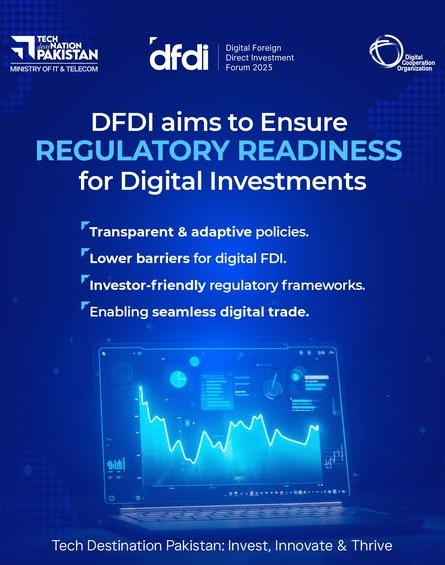Table of Contents
Register in DFDI – Your Gateway to International Investment Success
Register in DFDI to elevate your business with access to a global investment platform designed for innovation, growth, and success. The Dubai Foreign Direct Investment (DFDI) initiative offers streamlined services for entrepreneurs, investors, and companies looking to expand in one of the world’s most thriving economic hubs.
In this comprehensive article, we’ll cover everything you need to know to Register in DFDI, including the registration process, eligibility criteria, benefits, documentation, and more—all written in a simple and beginner-friendly way.
What Is DFDI?
The Dubai Foreign Direct Investment (DFDI) program is a government-backed initiative that facilitates foreign investors and businesses looking to operate in Dubai. It provides streamlined business setup services, investment opportunities, and access to global markets through regulatory ease and financial incentives.
The core aim of DFDI is to attract sustainable investments that contribute to Dubai’s economic development, promote innovation, and support businesses across diverse sectors.

Why Should You Register in DFDI?
There are numerous advantages when you Register in DFDI, including:
- Business-Friendly Environment: Dubai offers zero income tax, full ownership in certain sectors, and political stability.
- Fast-Track Business Setup: Streamlined and digital processes reduce the time to launch your business.
- Investor Incentives: Tax exemptions, visa support, and funding opportunities.
- Global Exposure: Dubai is a strategic hub for reaching markets in Asia, Europe, and Africa.
Eligibility Criteria to Register in DFDI
Before embarking on your journey to Register in DFDI, it’s essential to understand the eligibility requirements that ensure your business qualifies for registration under the Dubai Foreign Direct Investment program. The DFDI initiative is designed to attract quality international investments, and as such, only businesses that meet specific criteria are eligible. These criteria are in place to maintain a high standard of business operations and ensure that investors and entrepreneurs have a solid foundation to succeed in Dubai’s competitive marketplace.
1. Business Type and Sector
The first requirement for eligibility is the type of business or sector you wish to invest in. DFDI is open to a wide range of industries, but not all sectors are eligible for direct investment benefits. To Register in DFDI, your business must fall under one of the following categories:
- Technology: Startups or enterprises in tech innovation, such as software development, cybersecurity, AI, and blockchain.
- Manufacturing: Companies involved in industrial production, including equipment manufacturing, textiles, and pharmaceuticals.
- Finance and Banking: Businesses offering financial services, investment solutions, fintech innovations, and banking operations.
- Consulting and Professional Services: Businesses in management consulting, legal services, and other advisory roles.
- Healthcare: Hospitals, clinics, and pharmaceutical companies providing medical services.
- Renewable Energy and Sustainability: Businesses promoting green energy, sustainability, and environmental innovation.
- Tourism and Hospitality: Hotels, resorts, travel agencies, and related services.
- Logistics and Distribution: Warehousing, transportation, and supply chain management services.
Each business activity within these sectors is evaluated based on its contribution to Dubai’s economic diversification goals. Specific regulations may apply to certain industries, so it’s crucial to confirm whether your planned business activity is eligible before applying.
2. Minimum Investment Requirements
When you Register in DFDI, a minimum investment is required, which can vary depending on the type of business you plan to establish. Typically, DFDI targets businesses with substantial capital to support growth and ensure long-term success. The capital investment requirements will depend on the sector, business type, and location within Dubai.
For example:
- For technology and consulting businesses, the capital requirement may be lower compared to manufacturing and logistics, where higher investment is typically needed due to infrastructure and equipment.
- The required capital may also vary based on whether you’re setting up in a free zone or in mainland Dubai. Businesses in the mainland may require more substantial capital investments due to broader operational scopes and more extensive government regulations.
It’s advisable to consult with DFDI authorities or an expert to understand the exact financial commitment needed based on your business plan.
3. Legal Structure of the Business
One of the key eligibility criteria when you Register in DFDI is selecting the right legal structure for your business. Depending on the nature of your business, you can choose from several legal structures that comply with UAE laws. These structures include:
- Limited Liability Company (LLC): The most common structure for small and medium-sized businesses.
- Branch of a Foreign Company: If you’re already operating abroad, you may wish to establish a branch office in Dubai.
- Free Zone Entity: For businesses that prefer operating in designated free zones offering benefits like tax exemptions, no local sponsorship requirements, and simplified administration.
- Joint Venture: A business partnership with a local or international company where both parties share profits, losses, and responsibilities.
Selecting the appropriate legal structure impacts the registration process, ownership requirements, and legal obligations. Ensure that you select a structure that aligns with your investment goals, operational model, and long-term business vision.
4. Business Plan and Objectives
A well-structured business plan is essential when applying to Register in DFDI. DFDI registration authorities require a clear outline of your business model, market strategy, financial projections, and expansion goals. The business plan should demonstrate how your enterprise will contribute to Dubai’s economic growth and create job opportunities.
Important elements to include:
- Company Vision and Mission: Clearly define what your business aims to achieve and its core objectives.
- Market Analysis: A detailed analysis of your target market, competition, and industry trends.
- Operational Plan: Describe how you will manage daily operations, logistics, and staffing.
- Financial Plan: Provide forecasts for revenue, expenditures, and profit margins.
- Expansion Strategy: Outline your growth strategy, including how you intend to scale your business in Dubai and the broader Middle East region.
Having a solid and realistic business plan will make your application stand out and demonstrate your commitment to investing in Dubai’s economy.
5. Compliance with UAE Laws
To successfully Register in DFDI, your business must adhere to UAE’s legal and regulatory standards. This includes:
- Adhering to Local Labor Laws: Your company must comply with labor laws regarding employee rights, wages, working conditions, and safety standards.
- Following Environmental Regulations: Depending on your business activity, you may need to comply with environmental policies, especially if your business has an impact on the environment (e.g., manufacturing, construction, etc.).
- Financial Transparency: Your business will need to maintain transparent financial practices, report earnings, and undergo audits if required.
- Intellectual Property: Ensure that your products or services don’t violate any intellectual property laws, and you are compliant with patent and trademark requirements in the UAE.
6. Local Sponsor (for Some Business Types)
While many foreign investors enjoy 100% ownership when they Register in DFDI, certain business types—especially those that operate in the UAE mainland rather than free zones—may require a local sponsor. A local sponsor is a UAE national or a company with UAE national ownership, and they typically hold a small share (51%) in the business.
However, businesses that qualify for DFDI often benefit from special provisions that minimize or waive the need for a local sponsor. For example, companies in the technology, finance, and renewable energy sectors are often exempt from needing a local sponsor and can have full foreign ownership.
Always verify the specific requirements of your business type to determine if a local sponsor is required.
7. Experience and Track Record
For certain industries, DFDI may also require applicants to demonstrate a certain level of expertise or experience in the field. This could include:
- A history of business operations in similar markets.
- Proven success in your home country or previous investments.
- A track record of financial stability and growth in prior ventures.
Investors with a proven track record are often favored as they bring additional value to the business environment, enhancing the stability and credibility of the DFDI initiative.
Step-by-Step Guide to Register in DFDI
Follow these simple steps to successfully Register in DFDI:
1. Conduct Preliminary Research
Identify your business activity and confirm it is eligible for DFDI registration.
2. Choose Your Legal Structure
Select from options such as LLC, Free Zone Entity, or Branch Office depending on your operational needs.
3. Reserve Your Trade Name
Choose a unique business name that complies with the UAE naming conventions.
4. Submit the Initial Application
Register online through the DFDI portal by filling in business details and uploading initial documents.
5. Document Verification and Licensing
Authorities will review your documents, and once approved, you will be issued a business license.
6. Office Space and Visas
Secure office space and apply for UAE residence visas for you and your employees.
Documents Required to Register in DFDI
Prepare the following documents to Register in DFDI without delays:
- Passport copies of all shareholders
- Emirates ID (if available)
- Business plan
- Trade name reservation certificate
- Memorandum of Association
- Proof of capital/funding
- Tenancy contract for office location
- NOC (if applicable for UAE residents)
Keep digital and physical copies ready to expedite the approval process.
Common Mistakes to Avoid When You Register in DFDI
Avoid these pitfalls when you Register in DFDI:
- Incomplete Documents: Submitting incomplete paperwork causes unnecessary delays.
- Unclear Business Plans: Authorities need a clear understanding of your business goals.
- Wrong Trade License: Choosing an incorrect license can impact your future operations.
- Missing Deadlines: Be prompt in responding to DFDI requests or queries.

FAQs About How to Register in DFDI
Q: How long does it take to Register in DFDI?
A: Generally, 5–10 business days depending on document readiness and business activity.
Q: Can individuals apply to Register in DFDI?
A: Yes, both individuals and corporations can register as long as eligibility is met.
Q: Is DFDI different from Free Zone registration?
A: Yes, DFDI offers more global exposure and investment benefits while Free Zones are limited to specific geographic areas.
Q: Is local sponsorship needed to Register in DFDI?
A: No, many activities allow 100% foreign ownership under DFDI without local sponsorship.
Final Thoughts on How to Register in DFDI
To Register in DFDI is to take a powerful step toward establishing a solid and globally-competitive business in Dubai. With government support, business-friendly laws, and access to funding, DFDI registration can be the catalyst that accelerates your company’s global reach.
Whether you’re a first-time entrepreneur or a seasoned business leader, this guide equips you with everything needed to register smoothly.
Follow us on Facebook for Quick Response & Quires – Digital Foreign Direct Investment (DFDI)https://digitalforeigndirect.com/
